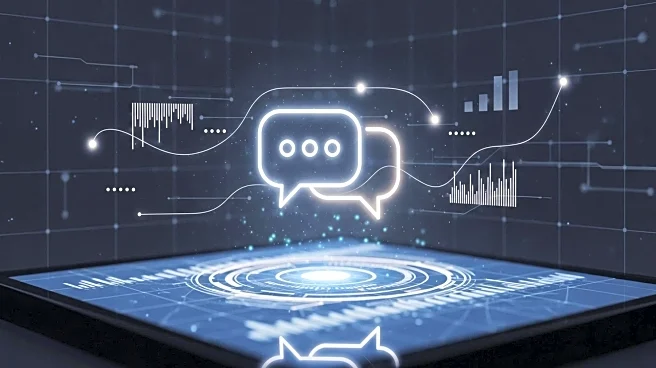What is the story about?
What's Happening?
OpenAI has published a comprehensive study detailing the usage patterns and demographics of its AI chatbot, ChatGPT. The study, which spans from May 2024 to June 2025, reveals that the majority of ChatGPT users are women, with a significant portion of the user base being young individuals aged 18 to 25. The research indicates a shift in usage from work-related tasks to personal applications, with 73% of interactions now categorized as non-work related. The study categorizes user interactions into seven main areas, with 'practical guidance' and 'writing help' being the most common. Additionally, the study highlights the growing use of ChatGPT for seeking information, which could potentially impact traditional web search dynamics.
Why It's Important?
The findings from OpenAI's study provide valuable insights into the evolving role of AI in everyday life. The shift towards personal use suggests that AI tools like ChatGPT are becoming integral in personal decision-making and daily tasks. This trend could influence the development of AI technologies and their integration into consumer products. Furthermore, the increasing use of ChatGPT for information seeking poses a challenge to traditional search engines, potentially altering the landscape of online information retrieval and advertising. Companies like Google may need to adapt their strategies to maintain their dominance in the search market.
What's Next?
OpenAI's study suggests potential business opportunities, such as integrating advertisements into ChatGPT conversations about purchasable products. The company is also developing parental controls to monitor children's use of the chatbot, addressing concerns about AI's role in personal relationships. The Federal Trade Commission's investigation into the potential harms of chatbots acting as companions could lead to regulatory changes affecting AI development and deployment. As AI continues to evolve, stakeholders in technology, business, and policy will need to navigate these changes to harness AI's benefits while mitigating risks.
Beyond the Headlines
The study raises ethical considerations regarding privacy and the psychological impact of AI interactions. The potential for users to form parasocial relationships with chatbots highlights the need for responsible AI design and usage guidelines. OpenAI's approach to analyzing chat data without compromising user privacy sets a precedent for ethical data handling in AI research. As AI becomes more embedded in personal and professional spheres, ongoing dialogue about its societal implications will be crucial.
















